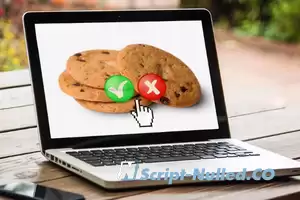
Whenever we surf the Internet we leave a trail. Web pages can collect information about where we are located, what we have searched for, the type of device we have used ... Websites will generate cookies, which are basically small files that are going to store data that can be useful for that page, so that you know more about who visits it and also so that users have a better experience. However not all cookies are the same. In this article we are going to talk about what types there are, what they are for and also what we can do to block them.
Types of cookies
As you will see, not all cookies are equal. Not all of them work the same way, although they will all store information. There will be them typical of the site, but also of third parties. You will see that there are differences depending on the time that will last, since they can be of a single session or persistent.
Excepted or not
The first thing we should mention is that there is excepted cookies and others that are not. Here we will find a clear first difference. Those that are excepted means that they do not need the consent of the visitors. Nothing should be accepted, as they are automatically collected without the user being able to do anything. These cookies are used to analyze different aspects of the page, detect problems and make everything work well.
On the other hand we find the cookies not excepted. Basically they are all the others, which are the majority. In this case, the user does have to accept or not, depending on what they want. When you enter a web page for the first time and you get a text message asking if you accept cookies or not, it is precisely these. Here we can put the ones that we will see below.
Own
These types of cookies are own website that we are visiting. They are necessary for those responsible for this website to have certain statistical data on visits. For legal purposes, the person responsible for these cookies will be the person in charge of that website and they will have control over them.
These own cookies on the page can be used to display the website according to the type of user. For example, if we enter from a mobile phone you can register that information and, when we enter again from that device, it will show us the screen adapted to that resolution. The same with the language or any other detail of the user.
From third parties
Unlike own cookies, in this case they are created by a third party, outside the website. In case that page uses any other people's service to analyze statistics and know how many visits there are, as you would be using third-party or third-party cookies. They are very common and practically all websites will use them.
Simply a website that has social media plugins, for example, will already use third-party cookies. They can collect user data, such as their name, links they have visited, etc. One more way to collect information and be able to show something more personalized depending on who visits that site.
Session
We can also differentiate the types of cookies based on the time they will act. One of them is session. What does this mean? Basically cookies will act as long as the user maintains the session started. For example, as long as you keep the browser window open and don't close the program.
These types of cookies are very frequent in online stores. If for example you enter Amazon or a similar page and add different products but close the tab and reopen it, you will see that they are still in the basket. However, when you close the browser and open it again and you see that they no longer appear, then you are facing cookies that expire at the end of the session.
Permanent
On the other hand, the other option is persistent or permanent cookies. They will last beyond that session. Although it is not undefined, it can last for quite some time. They can even take months. This means that, even if the user closes the browser, those cookies will remain there.
A clear example of persistent or permanent cookies is login. For example social networks such as Facebook or Twitter, email, a forum where you have registered… You can close the browser and leave the computer off for several days and then reopen it and you will automatically keep the session started. If so, you are facing permanent cookies.
Different according to their use
What are these cookies for? Here we find different types according to their usefulness. Some will serve for technical, analytical, advertising or also to store the preferences of users who visit a page. All this is going to be stored and can be useful both for the page itself and for visitors.
Preferences
In this case the website will register cookies to find out what the user preferences. For example knowing the language, the configuration of the screen dimensions, etc. When we first entered a website, many times they ask us to select some options, such as the language.
This is going to be saved. The next time we go in we won't have to put all of that back on. Not unless a long time has passed and those cookies have been removed or have been deleted manually. These are preferences that we select so that this page adapts more to us.
Techniques
They are also the cookies of technical level. They will store user data so that they can or cannot access a section or so that they have content that may be restricted. They will be necessary to keep the session started, they have security elements ( for example to avoid password filtering ), content sharing, etc.
They are widely used on web pages. We can say that the services and options they have to show us are essential for the proper functioning of many pages. If they don't work well there may be problems.
Analysis
These are used for create navigation profiles. In this way they will be able to learn more about the preferences of users, improve the offer they make of products, etc. They are very useful so that those responsible for a web page can carry out very extensive analyzes and have greater knowledge.
For example, they serve to know which section of the page they visit the most, which geographical area they are most interested in, etc. They will use very varied analytical data.
Advertising
One more type of cookies are advertising. They will collect information from the visitor, their tastes, searches they carry out, pages visited… In this way they can create a profile to know what to offer in advertisements so that they adapt better to what they expect to buy.
They can use social media cookies they are placed on a web page to record information on visitor behavior. Surely on some occasion you have made a search for a product, for example a mobile you want to buy, and from there you get related advertising.
Why are they useful
After talking about what types of cookies exist and how they work, we will explain why they are really useful. Keep in mind that they are so much on the part of the web pages we visit as well as for the users themselves, who are ultimately going to visit those websites.
If we start by talking about how useful it is for own web pages, We can say that those responsible for a website will have more information about who visits it. For example, they will know what tastes users have, which sections they usually see the most, how they interact with the page, etc.
It will also come in handy to get a person to end up buying a product. If you add something to the basket but do not finish the purchase, it will continue there when you re-enter and that will increase the probability that you will finally end up buying.
By users, Cookies are useful to facilitate navigation. For example, not having to log in whenever we enter the same page, being able to save preferences ( as a language, for example ) when visiting a website or following the products that we have been storing in the basket.
How to block them
However, cookie storage may not be of interest. You may want to directly block them and thus increase your privacy on the Internet. This is something you are going to be able to do and it is also simple. We are going to explain how to block cookies, the different steps you must take.
This is something that you will be able to do in the main browsers. We are going to focus on explaining the steps in Google Chrome and Mozilla Firefox for being the most used, but you are really going to be able to do it in a very similar way in others that you use.
Google Chrome
In the case of Google Chrome, by default it is configured to block third-party cookies in incognito mode. However, you can block all of them in any situation or even select certain websites that you do not want to register cookies or, conversely, that do interest you.
For this you have to go to the menu on the top right, you enter Configuration, Privacy and security and there you select Cookies and other site data. There you will see the option to block all cookies, those of third parties, delete them when you close the browser, etc. You can select the one that interests you.
From then on, if you select to block all cookies, the browser will block them. However, you should know that you will not be able to use these cookies to improve the browsing experience, personalize ads or that even some functions on those pages do not work correctly.
Mozilla Firefox
You can also block cookies in Mozilla Firefox. The process is similar. You should go to the menu on the top right and enter Settings. Once there you should go to Privacy and security and you will see that it is marked by default in Standard. This means that it allows third-party cookies and certain trackers when browsing.
To block cookies you will have to check the option of Custom and there select how you want it to act. You can display the menu that appears once you click on the arrow that comes out next to Cookies and there select the option that interests you most.
Once you have configured it, Mozilla Firefox will block cookies. From there you can navigate with more privacy. Of course, you may have problems entering certain pages and you will not take advantage of the benefits of cookies. At any time you can reverse the situation.
In short, as you have seen it is very easy to block cookies both in Google Chrome and in Mozilla Firefox. It is a quick process and you can carry it out at any time if you are interested in improving privacy when browsing.

 Spain
Spain
 Portugal
Portugal




